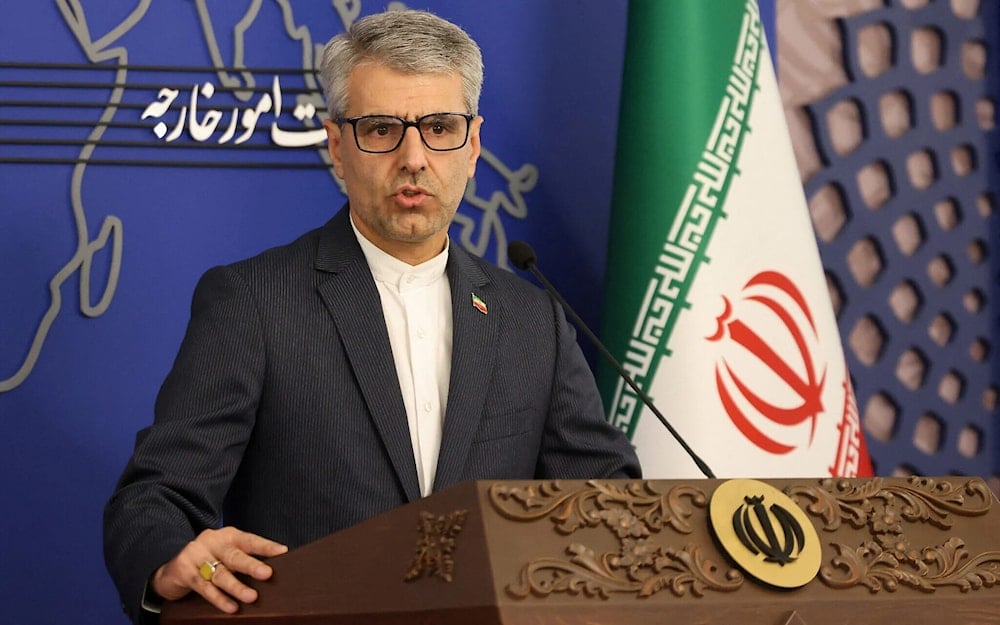Iran-US talks focused solely on nuclear issue, sanction relief: Tehran
The Iranian Foreign Ministry spokesperson reiterated Iran's firm stance on maintaining the indirect negotiations, citing the United States' contradictory statements and positions.
-

Iran's foreign ministry spokesman, Esmaeil Baghaei, holds a weekly press conference in Tehran on October 28, 2024 (AFP)
The Iranian Foreign Ministry spokesperson stated on Monday that the negotiations were strictly limited to the nuclear issue and the lifting of unjust sanctions on Iran, shortly after the first round of US-Iran negotiations on Saturday.
"There are contradictory positions expressed by several American officials, and they must resolve this inconsistency themselves," he stated, while emphasizing, "Our primary demand is the lifting of unjust sanctions," during his weekly press conference.
Baghaei responded to the contradictory statements from US officials regarding the indirect negotiations, stressing: "You cannot claim to negotiate while simultaneously applying pressure and threats—this is unacceptable."
"In these discussions, the concerned parties present their frameworks and initial positions. Our nuclear program is entirely peaceful—a fact confirmed by the IAEA—and there is no reason to deviate from our peaceful nature," he added.
Talks to remain indirect
On the upcoming second round of indirect negotiations set for next Saturday, the Iranian official emphasized that the physical location of the talks holds less importance than maintaining the current indirect format mediated by Oman.
The Foreign Ministry spokesperson indicated they would make an official announcement about the meeting venue after receiving final confirmation from Omani authorities.
Baghaei also emphasized that maintaining the indirect negotiation framework—facilitated by Omani intermediaries and involving the United States—remains Tehran’s top priority, as it is Washington’s contradictory positions that continue to push Iran away from direct talks.
"Drawing on proven past experiences, if we want negotiations to be effective—and if we're serious about diplomatic engagement—we must choose an approach we trust will work. We will continue with the format and method we have selected," Baghaei clarified when asked about whether there could be a point where the US and Iran negotiate directly.
The Iranian Foreign Ministry spokesperson addressed Trump's maximum pressure tactics and threats against Iran, stating, "As long as pressure and threats persist, direct negotiations will not take place, because using such language undermines international norms."
IAEA visit
Baghaei stated: "A preliminary agreement has been reached on the visit, though our representative in Vienna is currently finalizing the details in coordination with the Director General's office," noting regarding the IAEA Director General Rafael Grossi's planned visit to Iran, adding that "I expect it to take place this week."
The Foreign Ministry spokesperson reiterated Iran's stance on the nuclear agreement, emphasizing that it remains legally valid, adding that Iran will continue its diplomatic engagements in line with the deal's framework while monitoring developments.
Indirect Iran-US talks
Indirect negotiations kicked off in the Omani capital, Muscat, on Saturday evening.
According to the Iranian Foreign Ministry, the talks were held at a location designated by the Omani government, with Iranian and American representatives situated in separate rooms.
An Omani source told Reuters that the talks are focused on de-escalating regional tensions, prisoner exchanges, and limited agreements to ease sanctions in exchange for controlling Iran's nuclear program.
During the opening session, Araghchi handed Oman's foreign minister Iran's official positions and reiterated Tehran's intention to reach a "fair and honorable agreement from an equal standing."
He noted that if Washington shared the same intent, the current dialogue could pave the way for a serious negotiation process. However, he stressed that the talks are, from Iran's perspective, limited solely to the nuclear issue.
While no breakthroughs were announced, both sides agreed to resume talks next week, signaling a shared commitment to keeping diplomatic channels open. The discussions represent the highest-level engagement between Tehran and Washington since the 2018 collapse of the 2015 nuclear deal, following the Trump administration’s withdrawal.

 4 Min Read
4 Min Read








